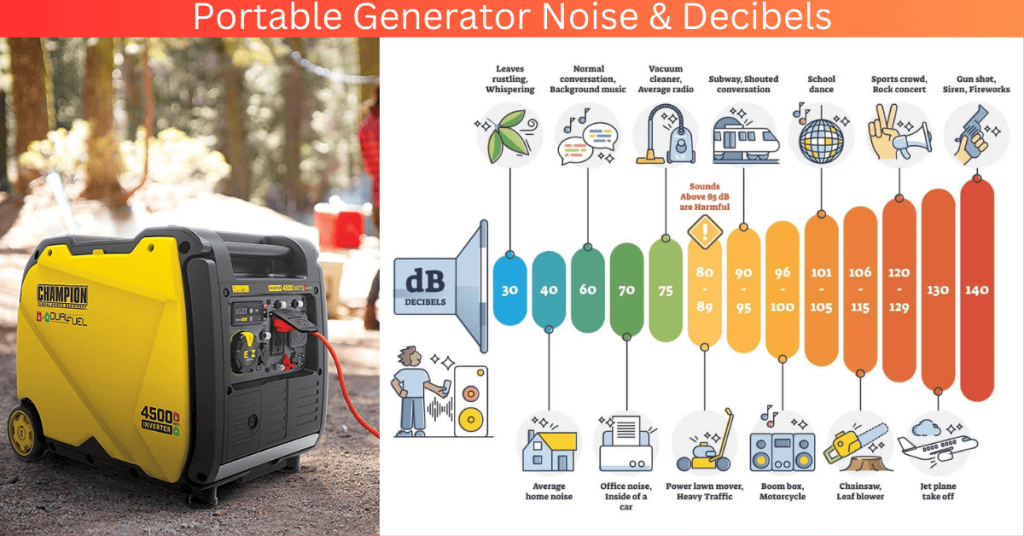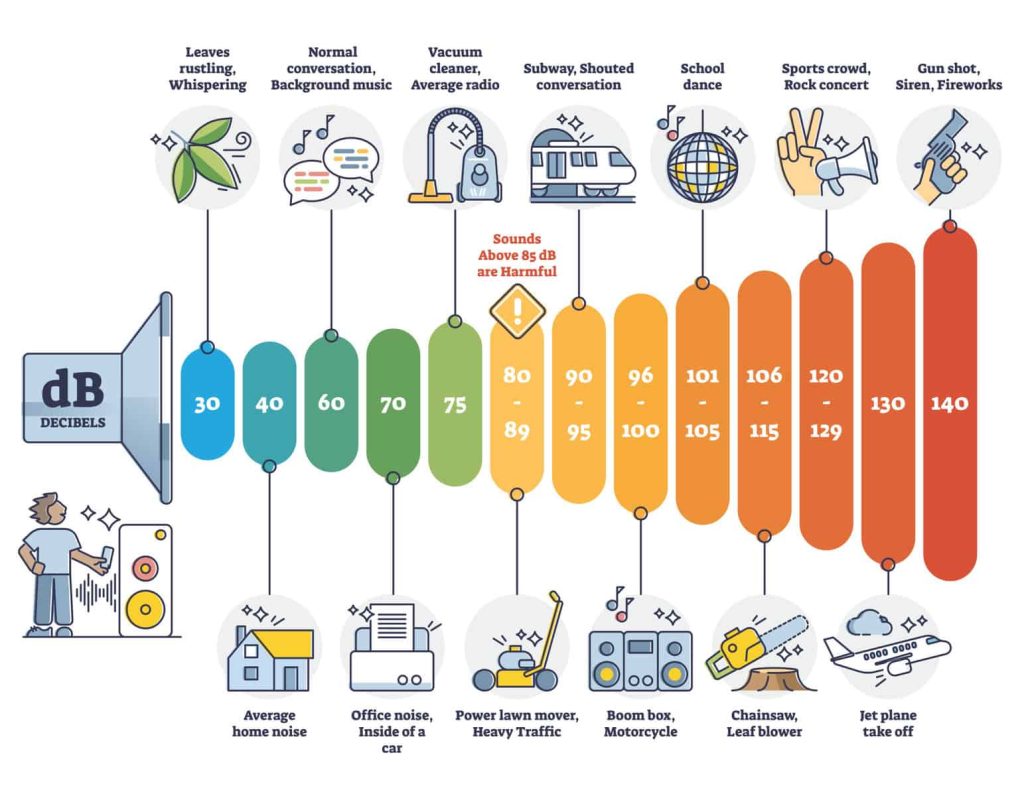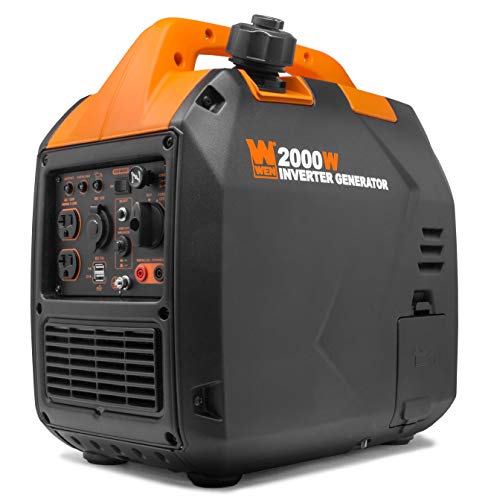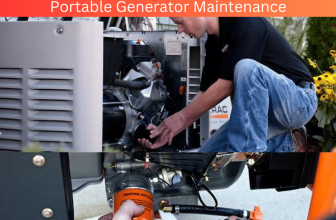Imagine this: you’re out camping, enjoying the serenity of nature, and suddenly a loud generator drowns out the peaceful sounds around you. No one wants to be that camper with an annoyingly noisy generator ruining everyone’s experience.
Thankfully, there are quiet portable generators on the market designed to minimize noise pollution while still providing essential power output. In this blog post, we’ll dive into understanding generator noise levels, explore various types of generators and their respective decibel ranges, and offer tips for selecting the perfect quiet portable generator for your needs.
Key Takeaways
- Portable generator noise levels are measured in decibels (dB), and understanding the decibel scale is crucial when evaluating different models.
- Inverter generators are generally quieter than open-frame or standby generators due to their sound-reducing components, making them an excellent option for outdoor activities.
- Other factors such as engine size, muffler system, load level, and distance from the generator can also affect noise levels.
- When selecting a quiet portable generator, consider power output needs, noise level requirements, type of fuel preferred, cost per wattage and portability needs, among others.

Understanding Generator Noise Levels
The decibel scale is used to measure generator noise levels, with most portable generators producing noise levels between 65 and 85 dB.
Decibel Scale
Understanding the decibel scale is crucial when evaluating portable generators, as it helps you determine how loud a specific generator will be during operation.
Decibels (dB) are used to measure sound intensity and follow a logarithmic scale, rather than a linear one.
For example, let’s say we’re comparing two generators – one with a noise level of 60 dB and another with 70 dB.
Factors Affecting Noise Levels
There are several factors that can impact the noise levels produced by a portable generator. As a potential customer, it’s essential to understand these factors so you can choose the best generator to meet your needs without causing unnecessary disturbance. Here’s a list of some key factors affecting generator noise levels:
- Type of Generator: Inverter generators generally produce less noise compared to open-frame or standby generators.
- Engine Size: Larger engines may produce more noise than smaller ones.
- Muffler System: A high-quality muffler system can help to reduce engine noise.
- Sound Absorbing Materials: Generators with sound-absorbing materials or insulation will likely be quieter.
- Load Level: Noise level often increases as the load on the generator increases.
- Distance: The further you are from the generator, the less noticeable the noise becomes.
- Fuel Type: Some fuel types may create louder engine noises (e.g., gasoline engines) compared to others (e.g., propane engines).
- Exhaust System Design: A well-designed exhaust system can help minimize engine noise.
- Maintenance and Age of Generator: Regular maintenance and timely replacement of worn-out parts can contribute to reduced noise levels.
By considering these factors when choosing your next portable generator, you’ll be better equipped to select a high-performing, fuel-efficient, and quiet device that meets your specific needs and preferences for power output and portability while also minimizing disruptions due to excessive noise levels in various settings such as camping trips or residential areas with strict regulations on outdoor sound levels.
Types Of Generators And Their Noise Levels
In this section, we will discuss the noise levels of different types of generators, including inverter generators, open frame generators, and standby generators.
Inverter Generators
Inverter generators are an excellent choice if you’re looking for a quiet and efficient power source. These generators not only produce less noise than their standard counterparts, but they’re also lightweight and portable, making them perfect for outdoor activities such as camping trips or tailgating parties.
One of the key advantages of inverter generators is their ability to regulate power output according to your needs. This not only conserves fuel but also minimizes noise levels even further.
For example, the WEN 56203i Super Quiet Inverter Generator produces a mere 51 decibels of noise at 25% load while providing up to 2000 watts—perfect for powering sensitive devices such as laptops or televisions.
Another great option is the Honda EU2200iTAG generator, which boasts a low noise level of just 57 decibels and offers up to eight hours of run time on a single tank of gas.
Open Frame Generators
Open frame generators are another type of portable generator that is commonly used in outdoor settings. They have a simple design and are more affordable compared to inverter generators.
However, they tend to be louder due to their open construction, which allows the noise from the engine to escape unobstructed.
While open frame generators may not be as quiet as inverter generators, they still have their advantages. For instance, they typically produce more power output than most inverter generators and can run for more extended periods without refuelling.
Standby Generators
Standby generators are permanent fixtures that are installed outside of a building, and unlike portable generators, they activate automatically during a power outage.
They typically run on natural gas or propane and require professional installation to ensure safety and proper operation. Standby generators vary in size from 7 kilowatts (kW) to over 100 kW depending on the power needs of the building they serve.
These generators can be expensive due to their larger size and automatic transfer switch mechanisms but can provide reliable backup power for homes or businesses.
What Is Considered Quiet For A Generator?
When it comes to generator noise levels, what is considered quiet varies depending on individual preferences and the surrounding environment. Still, in general, a generator that produces 60 decibels or less from a distance of 50 feet is considered quiet.
Noise Level Ranges
When purchasing a quiet generator, one essential factor is its noise level range. To give you an idea of how loud different types of generators can be, I’ve created a table with some typical noise level ranges:
| Type of Generator | Noise Level Range (dB) |
|---|---|
| Super Quiet Inverter Generators | 48-58 dB |
| Inverter Generators | Below or slightly above 60 dB |
| Open Frame Generators | 65-75 dB |
| Standby Generators | 60-70 dB |
As you can see, super quiet inverter generators offer the lowest noise levels, while open frame generators are generally the loudest. Consider these factors when selecting a generator that meets your specific needs and can operate within the noise regulations of your intended use.
Comparing To Everyday Sounds
It can be difficult to imagine how loud a generator can be without experiencing it firsthand. To put noise levels into perspective, let’s compare them to everyday sounds.
A standard generator operating at around 80 dB would sound similar to heavy traffic on a busy street or garbage disposal in your kitchen. In contrast, an inverter generator running at 60 dB or lower is about as loud as normal conversation or the hum of your refrigerator.
Keep in mind that with every increase of 10 decibels, the sound intensity doubles – so even slight differences in decibel level can make a big difference in noise output.
Factors To Consider When Purchasing A Quiet Generator
Consider the power output needed, noise level requirements, type of fuel preferred, cost and portability needs when purchasing a quiet generator.
Power Output
The power output of a generator is a critical factor to consider when selecting the right one for your needs. The more wattage a generator produces, the more electrical devices and appliances it can run simultaneously.
A quiet portable inverter generator like the WEN 56203i Super Quiet 2000-Watt Inverter Generator provides enough power output for everyday use while producing just 51 dB of noise at 25% load.
For heavy-duty applications, the Cummins RV Generator QG2800i/2500i is an excellent option that generates up to 2,500 watts of pure sine-wave energy with over seven hours of continuous operation at half-load capacity.
Noise Level
As a customer looking to purchase a portable generator, one of the most important things to consider is its noise level. Generator noise levels are measured in decibels (dB), and generally, inverter generators tend to be quieter than standard ones.
For instance, the WEN 56203i Portable Inverter Generator produces just 51 decibels of noise at 25% load. However, when considering a generator’s noise output, it’s essential to check the specifications since manufacturers may measure sound differently based on load and distance.
Additionally, most campgrounds have strict rules about excessive noise levels that usually don’t exceed 60 dB measured from 50 feet away.

Type Of Fuel
Another important factor to consider when choosing a generator is the type of fuel it uses. Most portable generators run on gasoline, but some models also use liquid propane or diesel fuel.
Gasoline-powered generators tend to be more widely available and affordable than other types, making them a popular choice for many customers.
If you’re looking for a quieter option, you may want to consider a liquid propane or diesel-powered generator. These generators are generally more expensive upfront but can provide greater fuel efficiency and cost savings in the long run.
Overall, the type of fuel you choose will depend largely on your individual needs and preferences as well as the specific requirements of your situation or project.
Cost
As with any purchase, cost is an important factor to consider when buying a quiet generator. In general, inverter generators are more expensive than traditional open frame generators, but they make up for the cost through their superior fuel efficiency and quieter operation.
For example, the Honda EU2200iTAG Super Quiet Portable Inverter Generator with CO-Minder may be pricier than some other generators on the market, but it’s high-quality construction and low noise level of 57 dB make it worth the investment.
Additionally, some brands offer affordable options that still provide relatively low noise levels such as the Champion Power Equipment 200987 Portable Inverter Generator which provides a noise output of only 61dBA and costs less compared to other portable inverter generators available in the market.
Portability
As someone who likes to take outdoor adventures, I understand how important it is to have a portable generator. Portability ensures that you can take your generator with you wherever you go, whether camping or tailgating.
When choosing a portable generator, consider its weight and size carefully. You want something that is light enough for one person to carry but powerful enough to meet your needs.
The WEN 56203i Super Quiet 2000-Watt Portable Inverter Generator weighs only 39 pounds and comes with an easy-to-carry handle built into the top of the unit, making it incredibly convenient for transporting from site-to-site.
Portability should factor into your decision-making process when purchasing a quiet generator as it will affect where and how often you’ll use it, ultimately determining what kind of investment this will be for you!
Automatic Throttling
One important factor to consider when purchasing a quiet generator is whether it has automatic throttling. This feature allows the generator to adjust its engine speed according to the required load, making it more fuel-efficient and quieter when running at lower loads.
For example, the Champion Power Equipment 200987 Portable Inverter Generator has an eco-mode that automatically reduces engine speed when producing less than 25% of its rated output, resulting in noise levels as low as 53 decibels.
Automatic throttling can also extend the lifespan of your generator by reducing wear and tear on its components.
Top Quiet Portable Generators On The Market
Discover the best quiet portable generators on the market, including the WEN 56203i Super Quiet Inverter Generator and the Honda EU2200ITAG with CO-Minder. With our comprehensive guide to noise levels and factors to consider when purchasing a generator, you can find the perfect one for your needs.
WEN 56203i Super Quiet 2000-Watt Portable Inverter Generator – 51dB
The WEN 56203i is a whisper-quiet portable inverter generator that produces only 51 decibels of noise at 25% load, making it one of the quietest generators on the market.
It can produce up to 2000 watts of continuous power, making it suitable for powering sensitive electronics such as laptops and smartphones. With its lightweight and compact design, you can easily carry this generator on your camping or tailgating trips while enjoying the peace and tranquillity around you.
WEN 56203i Super Quiet 2000-Watt Portable Inverter Generator w/Fuel Shut Off, CARB Compliant, Ultra Lightweight, Black/Orange
Generac 7127 IQ3500 Portable Generator – 52dB
The Generac 7127 IQ3500 Portable Generator is an excellent choice for anyone who wants a quiet generator that complies with the latest environmental regulations.
With a noise level of just 52 dB, this generator is rated as one of the top quiet portable generators on the market today. The advanced inverter technology and enclosure design make it over 5 dB quieter than some other popular models like the EU3000i, which means you can enjoy your outdoor activities without noisy interruptions.
It’s also CARB and 50-State compliant, making it environmentally friendly and safe to use no matter where you are. Starting up is easy, thanks to its power dial start/run/stop feature and electric start with battery included.
Generac IQ3500 3,500-Watt Gas-Powered Portable Inverter Generator - Easy Portability - Intuitive Power Dial - Clean and Reliable Power for Sensitive Electronics - CARB Compliant
Honda EU2200iTAG Super Quiet Portable Inverter Generator With CO-Minder – 57dB
One of the top quiet portable generators available in the market is the Honda EU2200iTAG. With a power output of 2200 watts and emitting only 57 decibels of noise, this portable inverter generator is perfect for RV camping, tailgating, or emergency home power backup.
It comes equipped with a Carbon Monoxide Detection System (CO-Minder) that constantly monitors emissions levels for added safety. The EU2200iTAG has a runtime of 8.1 hours and features an automatic low-oil shut-off function that turns off the engine when oil levels are too low, preventing damage to the machine.
Honda 664240 EU2200i 2200 Watt Portable Inverter Generator with Co-Minder
Champion Power Equipment 200987 Portable Inverter Generator – 61dBA
If you’re looking for a reliable and quiet portable generator, the Champion Power Equipment 200987 is an excellent choice. With a noise level of only 61dBA, it’s one of the top quiet generators on the market.
The Champion Power Equipment 200987 produces up to 4500 watts of clean electricity and features a wireless remote start feature, making it easy to use.
It also has an impressive runtime of up to 14 hours on just over two gallons of gasoline. Its safety features include automatic voltage regulation, low oil shut-off and overload protection.
Champion Power Equipment 200987 4500-Watt RV Ready Portable Inverter Generator, Wireless Remote Start
$899.00
Champion Power Equipment 200954 Open Frame Inverter Generator – 64dB
I recently came across the Champion Power Equipment 200954 Open Frame Inverter Generator, and I must say it impressed me. This generator is 50% quieter and 20% lighter than traditional generators of similar wattage.
It also features Economy Mode, which saves fuel and extends engine life – a great feature to have when on extended trips where fuel efficiency is crucial.
Additionally, this portable inverter generator operates at only 64 dBA of noise, making it perfect for RVs, camping trips, tailgating events or even outdoor projects around your home.
The generator has two convenient USB ports that enable easy charging of your electronics while on the go. Moreover, it comes with Clean Electricity for Sensitive Electronics – a unique aspect that ensures safe use with sensitive gadgets like laptops and smartphones.
Champion Power Equipment 200954 4250-Watt RV Ready Open Frame Inverter Generator, Quiet Technology
Noise Regulations And Etiquette For Generator Use
It is important to follow noise regulations and etiquette when using a generator, especially in campgrounds or residential areas. Failure to do so could lead to complaints from neighbours or even fines.
Campground Rules
Before heading out on a camping trip with your generator, it’s crucial to know the rules and regulations that apply to them. Most national parks do allow generators, but it’s always wise to double-check with the campground before using one.
There are noise limits in place for generators at campgrounds, typically ranging from 50-60 decibels at a distance of 50 feet to minimize disturbance for fellow campers.
Quiet hours also apply between 10 pm and 6 am and extend to generator usage as well. It’s essential to respect others and limit generator use during these hours to avoid disturbing fellow campers’ peace and quiet.
National Parks Regulations
It’s essential to know that national parks have regulations on noise levels for generator use. Many national parks enforce a campground generator noise limit, typically set at 60 dB when measured on the A-weighted scale at a distance of 50 feet.
To avoid any inconvenience or penalties, it’s crucial to check these regulations before taking your generator with you. Quiet hours between 10 pm and 6 am are usually designated in these regulations, so it’s recommended to limit generator usage during these periods to avoid disturbing others.
Residential Use
When using a portable generator for residential purposes, it’s essential to consider the noise level. Loud generators can cause disturbance and annoyance to your neighbors, leading to potential conflicts.
Choosing a quiet generator with low decibel levels is crucial when running at full capacity or half load.
The Cummins QG 2800i / 2500i and Onan P4500i are examples of generators built specifically for residential use with their noise reduction features that ensure they run quietly and efficiently without disturbing anyone nearby.
Furthermore, apart from its quiet operation, the P4500i also comes with an in-built parallel kit making it easy to add another generator if more power is required while still maintaining the low noise output.
Tips For Reducing Generator Noise
Proper placement, sound barriers and enclosures, and regular maintenance are just a few of the tips for reducing generator noise.
Proper Placement
It’s important to place your generator in the right spot to minimize noise levels. Keep it away from windows and doors, as well as any outdoor living spaces like patios or decks.
A good rule of thumb is to set up your generator at least 20 feet from any structure or campsite where people will be sleeping or spending time. If you’re camping, try to choose a site that has natural barriers like trees or rocks that can help block sound.
Remember that every generator is different and may have other specific placement needs for optimal performance and noise reduction.
Sound Barriers And Enclosures
If you want to reduce the noise level of your generator, one effective way is to use sound barriers and enclosures. Sound barriers can be made from materials such as wood, vinyl, or foam insulation and placed around the generator to absorb some of the sound waves created by the engine.
When I was camping last year with my family, we used a makeshift enclosure made from old blankets and cardboard boxes to muffle the noise of our portable generator. It worked surprisingly well! However, if you want a more permanent solution, many companies make custom-built soundproof enclosures specifically designed for generators.
Some models even have built-in ventilation systems to prevent overheating while minimizing noise emissions.
Regular Maintenance
Regular maintenance is essential for ensuring that your generator runs smoothly and quietly. By keeping your generator clean and well-maintained, you can reduce noise levels and prevent costly breakdowns.
One example of how regular maintenance can make a difference is with the Cummins Onan P4500i Portable Inverter Generator. This generator has a low oil shutdown feature that automatically turns off the engine when oil levels are too low.
By regularly checking the oil level, you can avoid triggering this feature unnecessarily, which helps ensure quiet operation in addition to preventing damage to your generator’s engine.
Conclusion
When it comes to portable generators, noise levels are an important factor to consider. Inverter generators are the clear winner when it comes to quiet operation, but other factors, such as power output and fuel efficiency should also be taken into account.
By choosing a generator with lower decibel levels, you can avoid disrupting your surroundings while still enjoying reliable power. Remember always to follow sound regulations and etiquette when using your generator in public areas.
FAQs:
1. What is considered a quiet portable generator?
A portable generator with a noise level of 60 decibels or lower is generally considered to be quiet, making it suitable for camping trips or use in residential areas without disturbing neighbors.
2. How does the noise level of a generator affect its performance?
High noise levels can indicate that the generator is working harder than necessary, which could cause premature wear and tear on components or reduce efficiency. Additionally, excessive noise may not be ideal for use in certain settings such as hospitals, schools or residential neighborhoods where it could disturb others.
3. Are there any regulations regarding acceptable sound levels for generators?
Some municipalities have restrictions on the maximum amount of noise allowed from outdoor equipment including generators–including concrete recommendations about what constitutes an appropriate volume range based upon time-of-day & location within city limits – so it’s important to research local ordinances before purchasing one to avoid potential fines.
4. Can I make my existing generator quieter?
It’s possible! There are several options available: upgrading exhaust mufflers, adding acoustic insulation around engines/motor enclosures and, modifying fan blades/building sound-proof boxes around gensets can all help bring down vibrations & minimize overall volume generated by systems during operation – consult manufacturer instructions/technical guides when attempting modifications though as unintended consequences may arise if done incorrectly.









